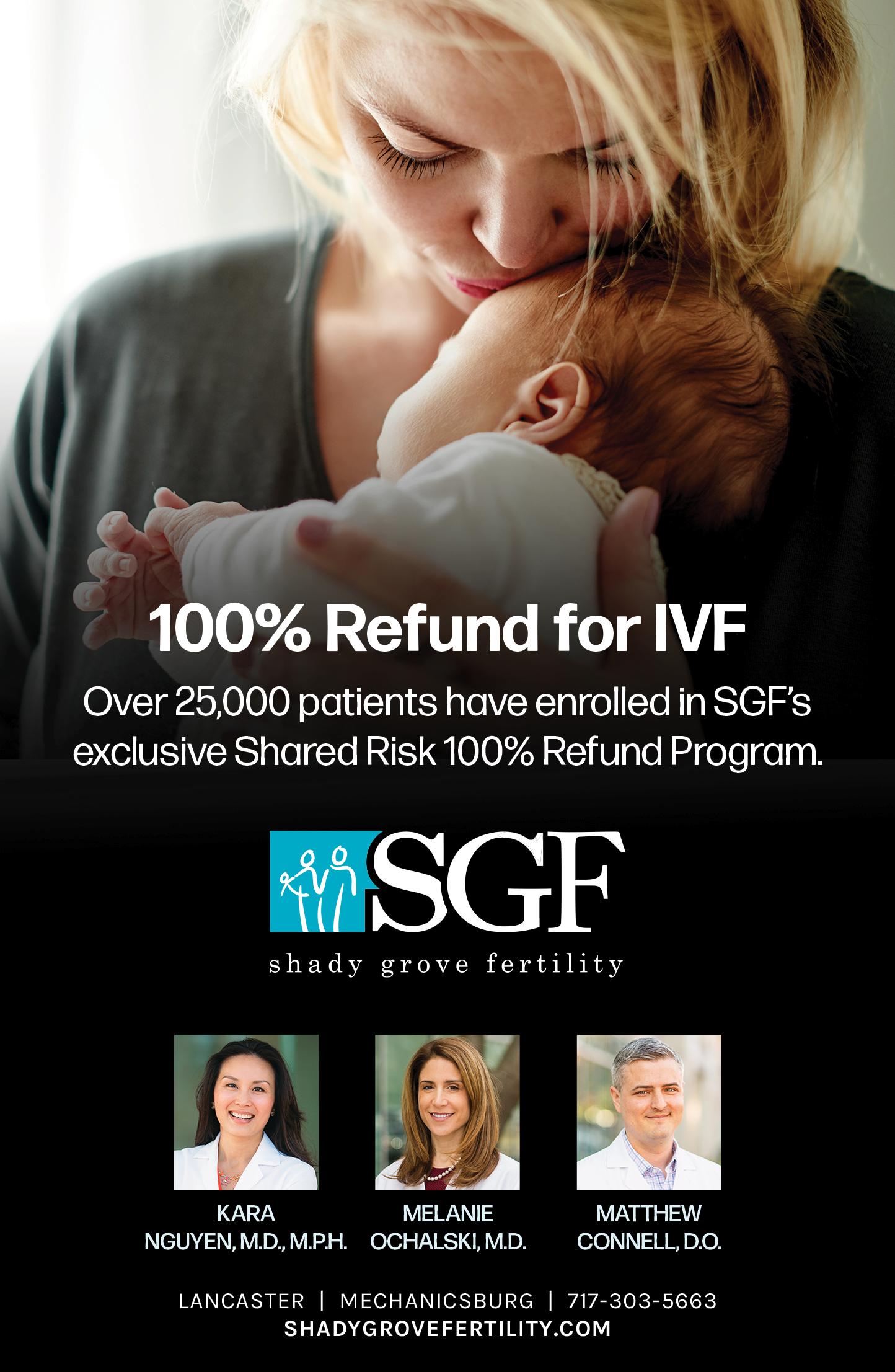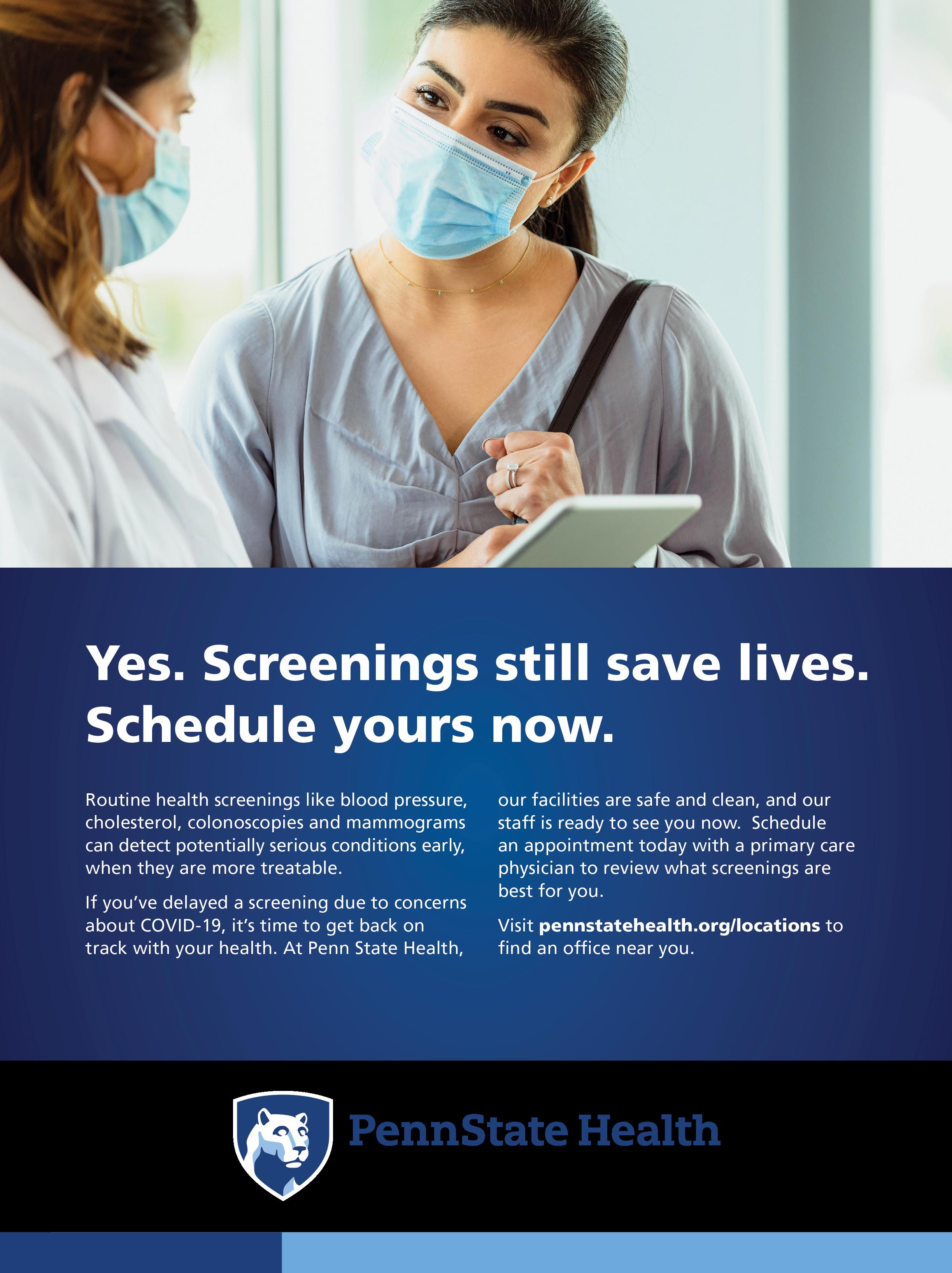
9 minute read
BABY BOOM
Fertility specialists’ high success rates offer patients hope in becoming parents
By Deborah Lynch - dlynch@harrisburgmagazine.com
F orty-two years ago, the world was transfixed by science. The birth of the world’s first “test-tube baby” in England seemed like something out of an H.G. Wells novel or an old sci-fi movie. On July 25, 1978, Louise Brown gained worldwide fame as the first child born who was conceived by in vitro fertilization (IVF). People were astounded that a baby could be produced outside the human body. What next, they wondered? Four years later, her parents used in vitro fertilization treatments to conceive her sister Natalie, then the world’s 40th IVF baby. When Louise turned 40 in 2018, more than 8 million babies had been conceived through IVF treatments. Dr. Matthew Connell, a fertility specialist at Shady Grove Fertility (SGF) in Mechanicsburg, met Louise Brown at a medical conference, where she recounted her experiences from the book she wrote on the occasion of her 40th birthday. Today, Dr. Connell is helping men and women locally to achieve parenthood through a variety of assisted reproductive technology treatments and protocols. With infertility rates as high as one in eight couples, his clinical expertise and success rates are in high demand. For every couple that walks in through the door for a fertility evaluation, Dr. Connell said that infertility can be attributed to a male factor 40 percent of the time, a female factor 40 percent of the time, and to either both or unexplained 20 percent of the time. Since Dr. Connell joined SGF in late 2019, he estimates that he has helped achieve 30 to 40 pregnancies among couples, and single men and women. “I kind of feel like every time someone gets pregnant and we get to graduate them, that’s a victory,” he said. “So, it is very special every time.” Since SGF first opened its doors in 1991 with its flagship Rockville, MD, office — which is located on Shady Grove Road — more than 85,000 babies have been born, averaging 12 babies every day. The milestone has been made possible with SGF’s expanding offices, including 37 practices along the East Coast, of which 18 offer full-service fertility care. Pennsylvania residents do not have to search far for care with SGF’s five locations across the state. Dr. Connell currently sees patients at SGF’s Lancaster and Mechanicsburg (full-service) locations. In Mechanicsburg, providers see patients from around the state including patients from State College and Pittsburgh. A State College area couple, Clairen Percival and Connor Weigand, both in their 30s, knew from the onset that if they wanted children, they would either need to adopt or seek the help of a fertility clinic. In 2009, Percival was 22 and attending graduate school at the University of British Columbia when she got a bad case of strep throat that would not go away despite being on antibiotics. Finally, she went to the hospital where a bone marrow biopsy revealed she had Acute Lymphoblastic Leukemia. After a long road to recovery that included chemotherapy and cranial radiation, it was discovered that she also had a chromosome abnormality, which put her at high risk of relapse. The best treatment was a stem cell transplant, so when her brother Ryland matched, she got his stem cells in March 2010. Percival’s infertility was a result of the chemotherapy. “My fertility was not something that was discussed at the onset of my treatment… possibly out of necessity to begin treatment immediately,” she noted. “After the induction phase of chemotherapy, I did seek treatment from a fertility clinic in Toronto, but at that point, it was too late.” Percival and Weigand first started their fertility journey four years ago. After consulting multiple health-care providers, Shady Grove emerged as a good fit for the couple, who decided to seek an egg donor. SGF’s Donor Egg Program is the largest in the nation and is one of only a few centers that recruits, selects, and medically, psychologically, and genetically prescreens its own ready-to-cycle egg donors prior to making them available on their donor egg registry. As part of SGF’s Donor Egg Program, patients have the choice to elect a shared egg donor, which is the method Percival and Weigand chose. This helps to make the treatment more affordable by offering patients the opportunity to split a cycle of eggs from a single donor between two to three anonymous recipients. “Choosing an egg donor was a strange process for us,” Percival said. “Shady Grove had a wonderful database of candidates, but for us, it felt kind of like we were on a dating app… Shady Grove also does a genetic screening to look for possible high-risk pairings. It took us some time to figure out what we were looking at for a donor, but we are happy with the decision we made and are excited for the future.” Percival and Weigand conceived and their baby is due in June. Years earlier, a Harrisburg-area couple turned to Shady Grove for treatments after going through six IVF treatments at a Baltimore clinic that never offered them other options. This woman had started fertility treatments when she was 33, but wasn’t able to conceive until she found SGF, which agreed that her eggs were the root of her infertility, and that a donor egg was the solution. At 39, she finally conceived. All egg and sperm donors are de-identified. This means that while prospective parents can see a few photos and review family medical history and background such as educational history about donors, they don’t get birth dates and other specific identifying details. Today, however, total anonymity no longer exists with the advent of Ancestry.com, 23andMe, and other genetic testing labs that have made it possible for donor-conceived people to find both their donors and possible half-siblings. A Donor Sibling Registry also can connect people by donor number. “We picked a donor who looked like me when I was 5,” the Harrisburg-area mother said of getting to see photos of potential egg donors from when they were 5 years old. She conceived on the first try, she said, but unfortunately, miscarried at five weeks. They had frozen eggs from the first donation to try again. This time she conceived and bore her son, and later a daughter through the same donor batch. Even though she lost the first baby, the experience at Shady Grove gave her hope. It was the first time she’d ever been able to get pregnant. “I had no problems going back. When we switched [from Baltimore to SGF], it was a much better outcome and more positive… . Shady Grove was more open to different treatments. They knew what we had gone through,” she said. “Having a single miscarriage is rather common,” said Dr. Connell, who researched recurrent pregnancy loss during his fellowship in Endocrinology and Infertility at the National Institutes for Health. “... up to 20 percent of patients have multiple pregnancy loss. “The number of tries are different for everybody,” Dr. Connell said of the treatment process. “Almost everyone can be successful, but sometimes that road to success is going to be different than what we intended it to be.”
The cost of fertility Cost is still the biggest barrier to fertility treatments. That’s why Percival and Weigand’s fertility journey took four years — first they had to save for it. The average cost of a single IVF cycle is $10,500 plus cost of medications, and many must pay that fully out of pocket. While insurances might cover the full cost in some states, Pennsylvania is not a mandated state, which means that some people, depending on their employers, might get full coverage, but many others won’t. This is why SGF acknowledges that the fertility journey is expensive and takes the philosophy that it is important to offer patients some type of financial program. Those programs include its Shared Risk 100% Refund Program, which is offered to qualified self-pay patients without insurance coverage. Women must be 40 upon completion of the IVF cycles to participate in the refund program although women 41 and older can participate if using donor eggs. The program includes up to six fresh IVF or donor egg cycles (and unlimited frozen embryo transfer cycles from those fresh cycles) — patients take home a baby or receive a refund. The SGF website claims that 82 percent of participants using their own eggs take home a baby, and 85 percent of patients using a donor egg take home a baby. The rest receive a refund. SGF also offers discount programs (such as a military discount), egg-freezing programs, medication discounts, financing, grants, and clinical trial programs. “At other clinics, it’s pay as you go, so you keep paying more. Once in our guaranteed program, you are in and it helps people who otherwise might not be able to do treatment,” Dr. Connell said, noting that the Mechanicsburg office sees a diverse clientele with people originally from all over the world coming to them for help. A popular media story about fertility procedures features those of multiple births from IVF like with Central Pennsylvania’s former reality star Kate Gosselin (Jon & Kate Plus 8 and Kate Plus 8) and the Octomom, Nadya Suleman, who gave birth to octuplets in January 2009. Those are rare cases, and another thing that sets SGF apart – along with being the nation’s largest fertility practice network – is its low rate of multiple births. “We’re very proud of our twin rate with IVF – it is in the single digits percentage-wise,” Dr. Connell said. “We pride ourselves on very high pregnancy rates, and very low twin and triplet rates.” That’s because SGF generally uses a single embryo transfer. SGF has been given a distinction as a Center of Excellence not only for high success rates, but also for low multiple birth rates. SGF also offers counseling and psychological services and makes a psychological consult a requirement for all third-party services, meaning the use of donor egg, sperm, embryo, or gestational surrogacy. Percival and Weigand feel they could use more guidance, but wonder if Covid affected that for them since their process was ramping up just as Covid hit. All of that comes back to initial consultations and a philosophy of patient autonomy. “My approach to patients is very collaborative, meaning that I’m really here to figure out what’s going on. I really just want to give them the information to help guide them with their choices,” Dr. Connell said. “I like to give them options and pick how we best move forward. I really like to work together to find what best suits patients.” SGF is also the preferred fertility provider for UPMC Pinnacle. Other fertility clinics in central Pennsylvania include Penn Fertility at Lancaster General Health in Lancaster, The Fertility Center of Lancaster and York, Geisinger in State College, and Penn State Health.












